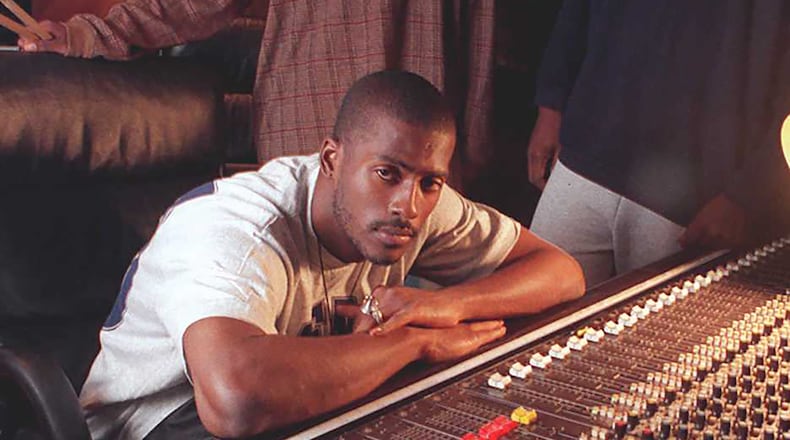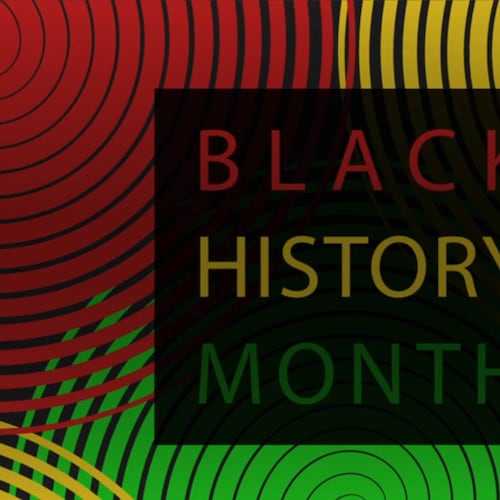“Hip-hop pioneer” absolutely describes Rico Wade.
His contributions to the group with the best-selling rap album of all time — OutKast’s “Speakerboxxx/The Love Below” — are enough on their own to earn Wade, an Atlanta original we lost April 13, that qualifier. But he was more.
Rico Wade was part of a 2023 Atlanta hip-hop history film. Here’s what he said (ajc.com)
If you ever had an opportunity to “experience” Rico Wade (“hang around” or “listen to” him don’t quite do the experience justice), you know what it was like to have his flurry of wide-eyed excitement directed your way.
Wade was a selfless, fun, one-man dispenser of things of which he was very convinced you should hear right this second, musically, professionally and personally. We won’t even get into the fashion tips.
Credit: Handout
Credit: Handout
Never mind if you couldn’t always understand every word of the aforementioned flurry. You know he felt it. Meant it.
And surely if you stayed within relatively close proximity to his lean frame long enough, a jolt was going to leap from his always-verbose hands to you. Resistance was futile.
Take what happened in the earliest OutKast days with LaFace Records executives, when LaFace Records came to the rapping duo asking them to make a Christmas song.
Fans of Antwan “Big Boi” Patton and Andre “3000” Benjamin of OutKast may not recall that their introductory single “Player’s Ball” first appeared on their Atlanta-based record label’s 1993 Christmas album. Rico was the one who helped sell LaFace’s idea to the group, setting the scene similarly to the way he opens the track describing to listeners what this holiday event looked like.
“Man, the scene was so thick... Lowriders, ‘77 Sevilles, El Dogs/Nothin’ but them ‘Lacs. All the players, all the hustlers... I’m talkin’ bout a Black man heaven here. You know what I’m saying?’”
Apparently they did. Next on the track came Andre’s voice saying, “It’s beginning to look a lot like…” Their debut album “Southernplayalisticadillacmuzik” followed five months later and included the song as well.
For all those familiar with the song but who hadn’t heard that story, those sleigh bells are sounding a lot more prominent right now, aren’t they?
This was Rico Wade, the producer. It was an apt title but at the same time, a starting point.
One of the many reasons listeners herald the iconic Quincy Jones is for producing Michael Jackson’s standard-bearing album for commercial and critical appeal, “Thriller.” Consider this though: As hard as it is to imagine being even more impressed with Jones’ legacy, what if he was the one who initially identified Jackson’s star power, and walked him into the Motown doors?
That’s the connection Rico Wade had, not only with the Dungeon Family but with Tionne “T-Boz” Watkins. In their teenage years, Wade, a salesperson at a southwest Atlanta beauty supply store, met Watkins, a Des Moines, Iowa, transplant, working at a hair salon on Stewart Avenue, now Metropolitan Parkway.
Rico the salesperson thought Tionne the beauty salon employee was cool, so he introduced her to another Atlanta music legend in the making, an executive named Ian Burke. Burke was putting together what would become R&B/hip-hop/pop trio TLC. T-Boz was born.
Meet Rico Wade, the A&R talent scout.
Credit: File photo
Credit: File photo
Wade and fellow Organized Noize members Ray Murray and Pat “Sleepy” Brown produced “Waterfalls,” the single from TLC’s 1994 “CrazySexyCool” album, which propelled them to becoming the best-selling female group of all time at that moment.
To be sure, “Waterfalls” is no one’s hip-hop song – Lisa “Left-Eye” Lopes’ featured rap included. And yes, even considering they are doing a slowed-down version of the Bankhead Bounce dance in the groundbreaking video.
The single’s horns, wah-wah guitars and the bluesy way T-Boz sings it could almost make “Waterfalls” pass for a country song, similar to how Beyonce’s “Cowboy Carter” album currently has many reconsidering the genre.
The Organized Noize sound and its universal appeal continued to evolve. The rocking, 1996 hit song “Don’t Let Go (Love)” by En Vogue, another Organized Noize production, was a musical surprise to many, coming from a quartet that earned its bonafides with R&B harmonies.
Then there was Mista. The soulful singing quartet’s 1996 bow “Blackberry Molasses” originated as “a lot of whale sounds,” Burke remembers.
“Rico asked me to come to his car to listen to some new music, and seriously, it was a bunch of whale sounds. But he told me he was going to have Marqueze [Ethridge] write to it and [he knew] it was going to be the hit it was.”
“Rico, Pat and Ray taught me so much,” adds Atlanta R&B singer Bobby V, who was still attending Sutton Middle School while singing as one-fourth of Mista.
“I mean, Rico got my attention just when I saw this young guy purchase a house around the corner of my parents. He taught me about being a man. And of course, real music. Live instrumentation… Having real musicians in the studio, creating with us was the Organized Noize way,” said Bobby V.
Rico Wade saw decades ago so much of what we hear from this city now. He looked around his predominantly Black neighborhood of lower and middle income-families, took pride in his peers’ varying artistries and instilled in those fortunate enough to create in his mother’s basement – globally known now as The Dungeon - that they would be the building blocks in Atlanta’s contemporary music scene.
His is a behind-the-scenes story told far too infrequently because he was content being the “talent whisperer” of sorts. Being prominent on the main stage was less important to him.
And as is too often the case with relatively headline-free, incredible success stories, in reflection, they are given quick glimpses.
Still, as Rico’s fellow Dungeon Family member Cee-Lo sings so sweetly on the OutKast song “In Due Time,” his contribution has to be fully considered.
And hopefully here, properly appreciated.
About the Author
Keep Reading
The Latest
Featured





